Drew Myron's Blog, page 19
September 1, 2020
No Caterwauling

No Caterwauling
Stiff upper lip,
the very thought
is our current
human existence.
Shock is our
reckoning.
— Drew Myron
cat·er·waul | \ ˈka-tər-ˌwȯl
1 : to make a harsh cry
2 : to protest or complain noisily
In an effort to keep my head bobbing above the crashing waves of doom, I’m writing, rewriting, and crossing out. Make something, I urge. Some days I make only only coffee, or my bed. Other days, I make dinner or a pie. On the very best days, I make a difference.
But mostly I make my hand move across a page.
And you — what are you making?
August 23, 2020
Summer Always Loves You Back

1.
Are you shoulder-burnt, lips swollen with wine and berries, with a season of satisfaction? Summer knows your story.
2.
Like a geography that grows, summer leaves its shadow — dusty lavender, new moons, slants of patio sun — and always loves you back.
3.
We chase light across every field, never ready for the end.
4.
If we should weep with change, with cool mornings and fading light, if our shoulders should drag and pale, let us remember this time of fortune and bloom, every green thing reaching for more, leaning into the next season with a slow hum of heat, with quiet nights still holy and full.
August 11, 2020
Frettered? Go Read A Book
Are you in the inbetween?
I’m swinging between wanting to settle and sink into a book, and being unable to settle and sink into anything. Busy, tired, frittered, frettered. Is frettered a word? It is now. New rules for this season of upheaval and unrest!
Need a book suggestion? Who doesn’t — it’s like asking if I need a glass of wine. The answer is always yes. In that spirit, I offer a few good reads:

ON DUFUR HILL
by Penelope Scambly Schott
This award-winning poet is prolific, and this book — her 22nd? — captures the charm of a small north-central Oregon town she’s made the home of her heart. These poems-of-place are both specific and wonderfully universal. Do you have a Mayberry you hold dear? Count yourself lucky, and drive on in. I love the sense of place rendered in these pages, but even more I appreciate the way this small town allows larger reflections to grow, as seen in this poem:
Woman Remembering Her Mother
When you were small, your mother
gazed at you with inexplicable grief.
She wanted to say, For my whole life
I have hoped to be known. But you
were a child so you couldn’t see her.
Such a long darkness between you —
I can’t explain why I weep now.
— Penelope Scambly Schott

FIST STICK KNIFE GUN: A Personal History of Violence
by Geoffrey Canada
An essential read. This first-person account of survival reveals our simplistic attitudes and actions toward crime.
“In poor communities the police simply tend to be more hostile, more aggressive, and racist than in middle-class communities. Many middle-class people in America have a hard time understanding why poor communities don’t necesarily see police as helpful in deterring crime, because in middle-class communities police tend to act differently. The friendly officer who has a citizen’s best interest at heart in one community is the hostile officer who shows nothing but disrespect in the other. When you have a mostly white police force in a community of color, the problem gets ten times worse . . .
The reality is this: we pay more to incarcerate kids across this nation than we do to educate them. Can we afford to lock up even more? America is not number one or even in the top fifteen when it comes to reading, math, and Enlgish. We’re number one in locking up children. Are our streets safer as a result? The answer is no. While we have foolishly invested our precious resources in a criminal justice approach to soliving our crime problem, we have nothing to show for it except poorer schools, poorer services for youth, and more people on the streets unemployable because they have a criminal record. Instead of educating and investing in young people to help them grow up and eventually give back to theis great country we have a crisis of voiolent youth on our streets that we pretend can be solved by a strategy that has already failed.”
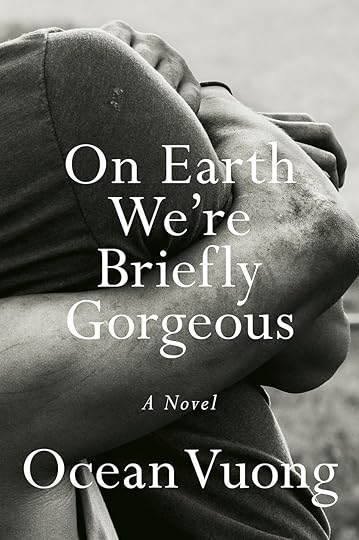
ON EARTH WE’RE BRIEFLY GORGEOUS
by Ocean Vuong
For months I resisted this book. Everyone loved it but because I cheer for the underdog, I eschewed the hype. But I was wrong, wrong, wrong!
The writing is, well, gorgeous. Vivid and sensory, rich and haunted. The novel is both long poem and full sigh. Beautiful and unusual. Line after beautiful line, passage after page. The mood is dense and rich, the pace slow, lonely and lovely.
“In Vietnamese, the word for missing someone and remembering them is the same: nhớ. Sometimes, when you ask me over the phone, Con nhớ mẹ không? I flinch, thinking you meant, Do you remember me? I miss you more than I remember you.”
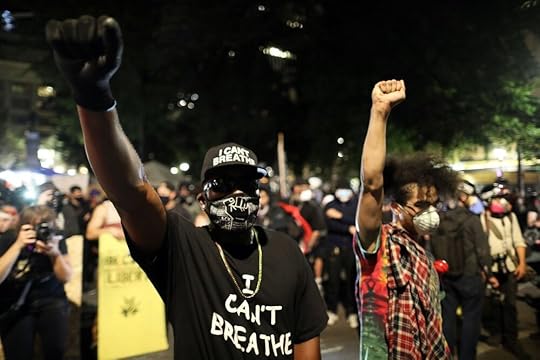
THE DEBATE OVER SYSTEMIC RACISM:
Why It Divides and Why It Provides Hope
by Gerald F. Seib, The Wall Street Journal
Trying to make sense of systemic racism?
Take a look at home ownership.
“After World War II, the federal government pumped millions of dollars into programs to build houses to develop the soon-sprawling suburbs — but under policies that denied those benefits to Black Americans. Houses were sold at a very, very cheap rate that allowed for generational wealth to be developed in the white population, and did not in the Black population.”
Read the crystalizing history in this brief piece.
YOUR TURN: How are you doing? And what are you reading?
August 4, 2020
Objects for Interior Life

Letter in late summer
Dear —
I am thinking of you, on these cool mornings
as I walk, and on the sweltering days as I weed.
I am thinking of you as I write, wondering
what you are making of your days, of this time,
of the heart, how it stretches and too often feels
about to snap but then the smallest thing
— a sunflower's reach, a child calling, or just light
moving across an old wood floor — brings you back
from an edge you nearly crossed, and for a moment
all is well, and for another and another until
it is late and dark and you have tucked
into comfort and you are “breathing just
a little and calling it a life.”
From this quiet space,
I am planning for happiness
and thinking of you.
With love,
Drew
July 29, 2020
Thankful Thursday: Leggy Resilience

It’s Thankful Thursday, a pause to express appreciation for people, places, things and more. Why give thanks? Because joy contracts and expands in proportion to our gratitude, and in these difficult days we must rise up, give thanks, and keep on.
Like a confession, I’ll admit my gratitude has been small, tired, and primarily comprised of whispered pleas of get me through this, please, please, please.
Still, I’m reaching for the small joys.
On this Thankful Thursday, I am grateful for:
the smell of bleach
sun-dried sheets
horoscopes
my patio
lavender
long soft evenings
my husband’s worn hands
the satisfaction of ironing
mail carriers
library2go
scientists
strangers who trust me with their stories
sunshine
wine
strong legs, strong arms
my dad’s smile
naps
a crisp cucumber
bike rides
audio poems
listeners
grocery store workers
my sister laughing
hope rooted in knowledge
tortilla chips, peanut butter, apples
quiet
czech national symphony orchestra
health insurance
fledglings
the neighbor who shares her garden harvest
the other neighbor who comes to my door crying
friends who send letters
nursing home housekeepers & nurse assistants
my lungs
the heavy-headed sun-soaked leggy resilience of sunflowers.
What are you thankful for today?
July 20, 2020
Try This: I Remember

Now, our days move with less activity and more reflection. A swarm of memory nags for attention. When the present slows and stills, who can avoid the lingering past?
I advise against it. Nostalgia is overrated. Sentiment is for saps.
And yet, in these heavy days, memories sneak in, sit down and take up space. Sometimes it’s best to give in to our misty water-colored memories, but with limitations. Let’s not drown ourselves in a glowing past, but instead, mine our memories for creative material.
I recently discovered a real gem of a book (50 years after it was first published; I’m always late to the party): I Remember by Joe Brainard.
It’s 167 pages of random recall. Each line starts with the same refrain, I remember, and it’s simple, funny, banal, and brilliant:
“I remember chalk.
I remember how much I tried to like Van Gogh. And how much, finally, I did like him. And how much, now, I can’t stand him.
I remember how sorry I felt for my father’s sister. I thought that she was always on the verge of crying, when actually, she just had hay fever.”
And that’s just page 28.
Memories are so powerful that we cling to them, and then push them away. And years later, when we forget our memories, we curse the loss of mind, our life, our sense of self.
Try This:
Start with I remember, and write the first thing that comes to mind. Don’t think, just write. Let your mind flow and your hand move. When that memory dries, make room for the next, and the next. . .
Now change perspective. Start with He remembers or You remember or . . . and write your first thought. It doesn’t need to be true or full or kind; this is writing, you get to make it up. Don’t think, just write.
When you finish your freewrite, review your work. Is there a good line or a passage with possibility? Start there. Write a story, a drawing, a play. Make a poem or painting. You now have the essential ingredients. Make something!
Feeling energized? Share your work with me.

July 11, 2020
Make do, make up, make something

Make up.
Make do.
Makeshift.
Make a cake, a drink, a doozy, a dud.
What I’m saying is, to get in, around and through, you gotta make something. Kick your inner critic. Now is the time to make junk. Get loose, let go.
What are you making?
I’m making lists, letters, meals, memos, poems, pictures, cookies, collage, drawings, darings, delights. I’m playing with words and dreams and fears. I’m staying close, inside, mining the interior of mind and memory. I’m making do with the tools I have: paper, pen, words and glue.
Will you join me? Let’s raise the rate of artful expression. Make something now.
Fissure
You want a show, something worth seeing
but here lights blink, engines stall and
cheat grass takes hold of every chance.
Want is a language of rusted grumble.
You long for the comfort of a crossing,
some magical door, an arch, to meadowlark
and soft rolling slope. But what good is
this ache, this pressing want?
You must find the merits of giving up.
Take a flicker of light, some heat, any
thing to stoke your hope. Let the world
split open. In everything fissure.
— Drew Myron
July 4, 2020
Not Rockets
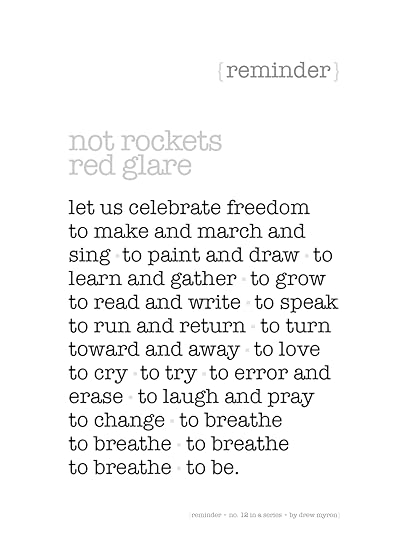
What are you celebrating today?
Not rockets red glare
or bombs bursting in air
Let us celebrate freedom
To make, march, sing & paint.
To learn, gather, grow.
To read, write, speak.
To run, return, remove.
To turn toward and away.
To love. To cry. To try.
To error and erase.
To kneel and pray.
To change.
To breathe.
To breathe.
To breathe.
To be.
— Drew Myron
July 1, 2020
A Song, A Movie, A Book
Check your influences. You are what you consume. Books, music, movies — how are you feeding your mind?
Yes, I’m still making a meal of Diet Coke and chips, and overindulging on 1990s television, but I’m trying to balance the junk with the gems. Here are a few of my recent (better) influences:
LISTENING: March March
Just last week The Dixie Chicks The Chicks and released this driving song and powerful video. (And catch the protest sign: Ditch Your Racist Boyfriend — that’s excellent copywriting).
See Also: Michael Franti - This World is so F*ucked Up (But I Ain’t Never Giving Up On It)
WATCHING: The End of the Tour
I’m not sure how I missed the early 2000s fanfare for David Foster Wallace and Infinite Jest. But this movie, based on an actual weekend between a Rolling Stone reporter and Wallace, is good stuff. It’s talky and insightful, with great acting and touches of humor.
See Also: This is Water - commencement speeech
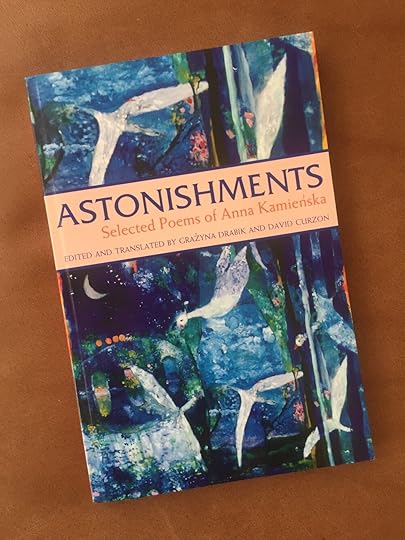
READING: Astonishments
This is a quiet book of poems by Polish poet Anna Kamienska. The second half of the collection features extracts from The Notebook, in which she shows a profound and lonely struggle with faith. Line after line pierces and shines:
“In this time of anxiety and searching, one should write something, shape something. Whatever it might be, it could lead to proposing some kind of sense and order. Any situation can become a starting point. Knowledge of life doesn’t have specific beginning and an end. It is like the earth: any point on it can become the beginning or the middle.”
TELL ME:
What’s influencing you — what moves your heart & mind?
And what are you shaping?
June 26, 2020
Try This: Wild Cards


Pick a card, any card.
I had forgotten how much I love Poetry Poker!
The other day while cleaning my office, I found these wild cards and the past rushed back to say hello. I made this deck years ago while leading youngsters to the power and fun of writing — but really, this prompt works for all ages (as is true for nearly every writing exercise).
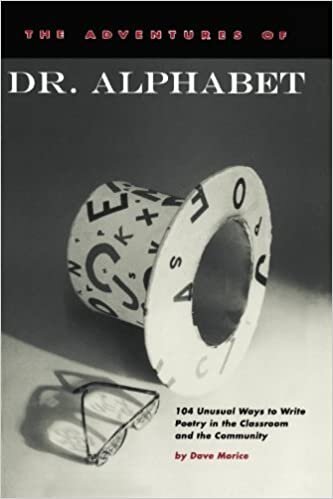
This game, courtesy of Dr. Alphabet, is a fun way to loosen the mind and play with words. Simply take a deck of cards, add unusual words and phrases, deal a hand, and make a poem, write a song, start a story, or . . . . just have fun with possibilities.
And let’s take a moment to applaud Dr Alphabet, aka Dave Morice. He’s my kind of writer: ireverent, unusual, artful, and a “muse out of the world of Dr. Seuss.” Read all about his inspired, lifelong dedication to word play here.
Your turn: Make a Wild Card piece. Don’t think too much, just let the cards fall and the words flow.
More Writing Prompts:
Try This: Word Catching
Try This: Where I’m From
Try This: Make A Scramble
Try This: You Know the Gnaw



